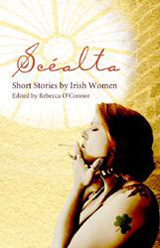
The Irish women writers featured in Scéalta truly do have, as editor Rebecca O'Connor writes, "the gift of the gab". Sitting down with this short fiction anthology is like sitting around the kitchen table with a diverse group of best friends - loud, emotional, and eclectic. Each author brings her own unique voice to a collection of stories united in the depiction of very normal people with very troubled lives. The thoughts and feelings of the characters ring true; these are women with whom readers will identify.
The opening story, Judy Kravis' "Dearest Everyone," establishes one of the themes running though Scéalta: loneliness. Sitting in an abandoned Alpine hotel, the unnamed narrator contemplates his uninspiring past, waiting for the impending snowstorm to rise above his window and cut him off from the rest of humanity. The mother in Claire Keegan's "Men and Women" is another lonely character, living in a loveless marriage to a philandering husband. Unlike Kravis' narrator, Keegan's character refuses to accept her fate, and begins a subtle rebellion against her controlling spouse.
"Men and Women" is the first in a series of stories with young narrators. Eithne McGuiness' "Feather Bed" and Cherry Smyth's "Walkmans, Watches and Chains" also feature child narrators who are thrust into the world of adult relationships. These authors do not look upon adults in positive ways, instead depicting them as sinister people who prey on the naïve. Smyth's story of a pedophile is particularly disturbing, drawing the reader into a world we hope to forget — but cannot.
This is the power of Scéalta. Though short, these narratives stay with you long after you finish
reading. Each one is thought provoking on its own; together, they form an anthology teeming with ideas
that will give readers much to discuss—our own chance to practice the "gift of the gab."

Telegram Books, paperback, 9781846590030